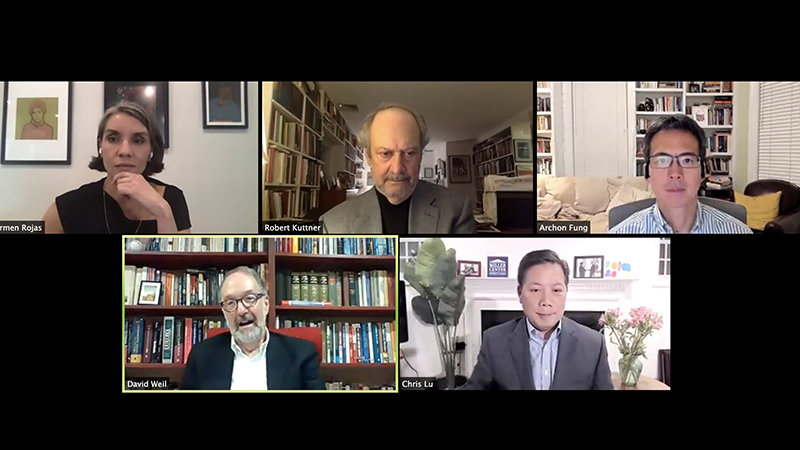
By Bethany Romano, MBA’17
Two weeks after Election Day, Dean Weil hosted a Zoom panel discussion about the road ahead for progressive social policies and socio-political movements. Weil’s guests included Professor Archon Fung of the Harvard Kennedy School of Government; Heller Professor Robert Kuttner, cofounder of the American Prospect; Chris Lu, a senior fellow at the University of Virginia Miller Center and former U.S. deputy secretary of labor during the Obama administration; and Carmen Rojas, president and CEO of the Marguerite Casey Foundation and founder of The Workers Lab. (Lu and Rojas are return guests, both having participated in Conversations with the Dean in previous years.)
In his opening remarks Weil described the 2020 election in terms of record voter turnout and campaign spending. Yet, he said, quoting a New York Times article, “voters seem to have issued not a mandate for the left or the right but a muddled plea to move on from Trump-style chaos.”
In response, Fung compared our present political moment to a pressure cooker. “For most of our lives, the pressure was at a low simmer. But now [the pressure] is high, and there’s danger of our institutions cracking,” he said. For him, the question is how President-Elect Biden can move forward on his priorities without adding stress to an already tenuous situation.
Lu, who experienced Presidential transitions at both the beginning and end of the Obama administration, described how difficult and unusual the Trump-Biden transition is already proving to be. “Under normal circumstances, transitions are hard. You’d never turn over the entire leadership of a university or company in a single day, but we do it for the U.S. government.”
Weil turned the discussion to social movements, asking Rojas to comment on how progressive advocacy groups may move forward during Biden’s administration. She noted that social movements saw important victories on Election Day, especially at the city and state level.
“[The Democrats] lost Florida, but Florida raised the minimum wage. Who would have thought?” she said. “I think it’s going to be a slog for this administration, so I’m really looking to cities and states where gains are made.” In many red states, she added, progressive ballot measures passed by substantial margins despite voting for President Trump.
“There are things that Biden could do that are unifying, transformative, that he needs to do,” added Kuttner. “Biden needs to do two things that are in conflict with each other. He needs to manage a racial reckoning. On the other hand, you need an economic reckoning. I think if those two things can come together, we have a chance.” Kuttner added that many progressive policies enjoy broad popular support, such as pathways to citizenship, supporting “Dreamers,” and passing economic stimulus measures during the pandemic.
As with Dean Weil’s pre-election Conversation with the Dean event, he chose to close the session by asking each panelist to share something that gives them hope. All four spoke to a rise in civic engagement—particularly among young people—and an openness to discussing progressive ideas.
“What gives me hope is that people are talking about ideas and policies that for much of my political adult life, were in the deep freeze,” said Fung. “People are talking about economic equality in a way they just haven’t for 40 years. There are ideas and values on the table now that just weren’t there before.”
